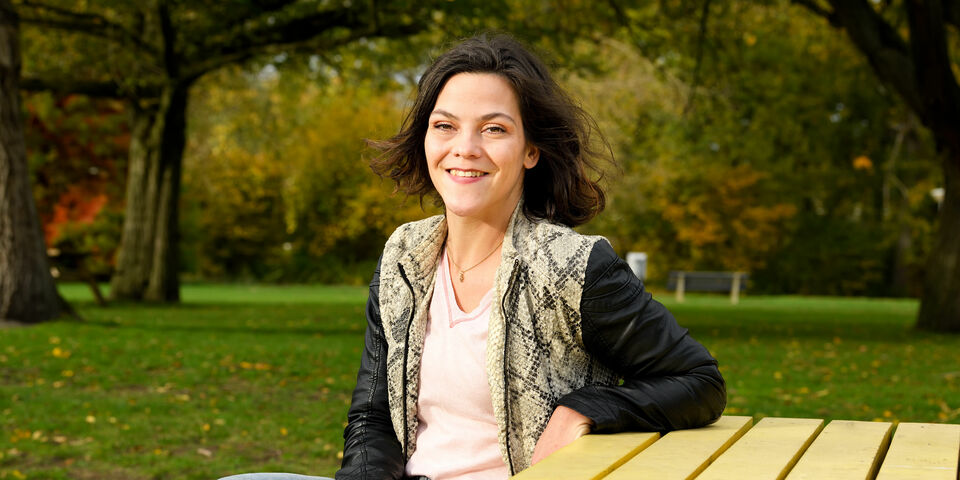Roos has ataxia: “These days I couldn't care less what people think of me”
If there is one personality trait that fits Roos van Otterdijk, secretary at the Control Systems Technology group, like a glove, it is determination. A shortage of oxygen during her birth caused ataxia; her body makes uncontrolled movements, non-stop. Roos won't be deterred though, and as for being labeled and dismissed - no way.
Roos (27) is one of the faces of a campaign run by the Dutch association for cerebral palsy (CP). CP is a posture and movement disorder that is caused by damage to the brain. Ataxia falls under the umbrella of cerebral palsy. By taking part she wants to show that there is more to her than just the girl who makes strange movements the whole time. “People have expected me to be capable of nothing all my life, which triggers me to show that I am capable.”
This self-assured attitude is something she has acquired. “When I was born my parents were advised to prepare for the worst. The doctors said, ‘Everything she can do is a bonus’.” But that didn't take into account the determination of both Roos and her parents. “My parents soon saw that I was alert and responsive to them, even though my movements were jerky and odd.”
In at the deep end
Everything was tried to stimulate Roos to use every ounce of her potential. Physiotherapy, occupational therapy, play therapy, massages, courses at Blixembosch. As a small child she was collected every day and taken to this rehabilitation center in Eindhoven.
“My parents always threw me in at the deep end when it came to getting on with things, doing things for myself. I wasn't always happy with that, but looking back it was the right way to go.”
Simply a colleague
This fighting spirit has got her to where she is now, contrary to all preconceived notions. For the past two years she has been working at the Control Systems Technology group as a secretary. “This is the first job where I've thought: now I'm a full member of the team. This gives me considerable peace of mind. For a while I don't need to fight, here I'm simply a colleague. I feel that I'm appreciated and that is really nice.”
Thanks to the Participation Act, Roos found her job in Maarten Steinbuch's group. At the same time, she has a love-hate relationship with this piece of legislation. “I'm a full-fledged member of the team and my ambitions go beyond this job, but it's not easy to cut loose from the Participation Act. I want to build something and keep on growing. I can do more than this. At the department they understand me, but because of the fact that my job has been arranged under the Participation Act, there aren't that many possibilities.”
Anxious adolescence
As openly and honestly as she might talk now about her ataxia and her life, this wasn't always the case. Roos had a particularly tough time of it during adolescence. “I always wanted very much to be normal and to do what other people were doing. Not to stand out.” With her ataxia that was a challenge, to say the least. “You think that everyone is looking at you all the time. At a certain point I started hiding myself away, didn't dare move. If I did the smallest thing, I'd stiffen, freeze. I didn't dare eat my sandwiches in the dining hall, scared of standing out and making strange movements.”
Adolescents are not mild in their judgments of other people, although Roos had no lack of friends who stood up for her. “I have never felt lonely, but during my high school years I spent a lot of time staying home supposedly sick.”
Further education
Finding a further education course after high school did not prove easy. Courses weren't universally eager to accept Roos, schools were worried that she would not be able to manage. She was accepted for Social Care, but did not complete the program with a certificate. “I had to pass all the competences. One of the tasks was serving coffee. Duh, of course I can't do that without making a mess.”
To channel her feelings, Roos started writing. About her experiences, her feelings. She started a blog and received positive reactions. “That helped me so much: at last, something I was good at!” She is now writing columns for CP Nederland. “I like to get things across in a lighthearted way, I don't like moaning. In time I'd like to do more with my writing, but what form that will take I've not yet decided.”
Let yourself be seen
The young woman looking into the camera during this Skype interview has come a long way. She presents herself as open, down-to-earth and self-aware. Yes, the muscles in her face contract involuntarily but as soon as she starts talking, this fades into insignificance. “It's simply something I live with, all the time. In the past I didn't dare walk past an outdoor cafe, I was fearful of what people would say about me because I walk oddly. Now I really couldn't care less. I think I dare to let myself be seen more than someone who has nothing wrong with them. I'd passed the age of twenty, had a lot of ups and downs, before this happened, but now I know: you live for yourself! It is a crying shame to keep on adapting to suit other people.”
About CP
Would you like to know more about cerebral palsy? Then click here: ditiscp.nl. The short film made about Roos for the campaign is also here.





Discussion